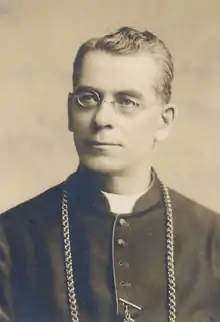
Eleutheropolis in Palaestina is a titular see of the Roman Catholic Church located in modern Israel.[1] The position of bishop is vacant.
History of the see
In A.D. 200 Septimius Severus founded a Roman colony on the site of a previous Jewish town, Maresha, destroyed by Vespasian 130 years earlier.[2] The new colony grew quickly,[3] due to its location on important trade routes and in 325 it became the site of an episcopal see in Palaestina Prima, with Macrinus as first bishop.
Eusebius of Caesarea an important early church writer who lived at this time and was based from this Bishopric used it as a starting point for measuring distances of other locations.
We know of only six bishops, with Macrinus, and Zebennus being the only ones named, there are another four for whom we don’t know their name.
Church texts mention 50 soldiers who were executed here in 638 for not abandoning the Christian religion following the arrival of Islam. Their burial site is in the vicinity of the town. The diocese ceased to function effectively from this time.
The last titular bishop was Alfred Matthew Stemper.[4]
Notable persons

- Bishop Epiphanius of Salamis
- Eutchius[5][6]
- Peter of Eleutheropolis
- Justus of Eleutheropolis (the legend of him at Eleutheropolis is possibly untrue.)
- Matthias[7]
Known bishops
- Zebennus[8]
- Macrinus fl.359[9]
- Paul-Eugène Roy (8 Apr 1908 Appointed – 26 Jun 1914)[10]
- Nicolás de Carlo (2 Aug 1918 Appointed – 1 Aug 1940)
- Michel Thomas Verhoeks (16 Oct 1941 Appointed – 8 May 1952)[11][12]
- Giuseppe de Nardis (1 Apr 19 numb 53 Appointed – 18 Dec 1956) [13][14][15]
- Alfred Matthew Stemper (5 Jul 1957 Appointed – 15 Nov 1966)[16]
References
- ↑ Eleutheropolis in Palaestina
- ↑ Josephus, De Bell. Jud., IV.viii.1
- ↑ Ammianus Marcellinus (Res Gestium, XIV, 8: 11-2),
- ↑ Eleutheropolis in Palaestina, at Catholic-Hierarchy.
- ↑ Louis Ellies Du Pin, William Wotton, A New History of Ecclesiastical Writers:: Containing an Account of the Authors of the Several Books of the Old and New Testament; of the Lives and Writings of the Primitive Fathers; an Abridgment and Catalogue of Their Works; Their Various Editions, and Censures Determining the Genuine and Spurious. Together with a Judgment Upon Their Style and Doctrine. Also, a Compendious History of the Councils; with Chronological Tables of the Whole, Volumes 1-2 (Abel Swalle and Tim. Childe, 1693 – Christian literature, Early).
- ↑ Jan Willem Drijvers, Cyril of Jerusalem: Bishop and City (BRILL, 1 Jan. 2004) p41.
- ↑ The Ancient Ecclesiastical Histories of the First Six Hundred Years After Christ. The Sixth Edition Corrected and Revised, Etc (Abraham Miller; to be sold by Francis Tyton, 1663) p539.
- ↑ Adam Clarke, The Holy Bible, Containing the Old and New Testaments: The Text Printed from the Most Correct Copies of the Present Authorized Translation, Including the Marginal Readings and Parallel Texts, with a Commentary and Critical Notes, Volume 4 (J. Emory & B. Waugh, for the Methodist Episcopal Church, 1829 ) p 439.
- ↑ Bishop Demetri Khoury, A Cloud of Witnesses: Saints and Martyrs from the Holy Land (AuthorHouse, 6 June 2008) p 628.
- ↑ "Diocese of Surabaya, Indonesia".
- ↑ Annuario Pontificio, Year
- ↑ Revue des Ordinations Episcopales, Issue 1942 number 21.
- ↑ Annuaire Pontifical Catholique Year 1939.
- ↑ Hierarchia Catholica, Vol.9 p40.
- ↑ Revue des Ordinations Episcopales, numb 60.
- ↑ Le Petit Episcoploge, Issue .